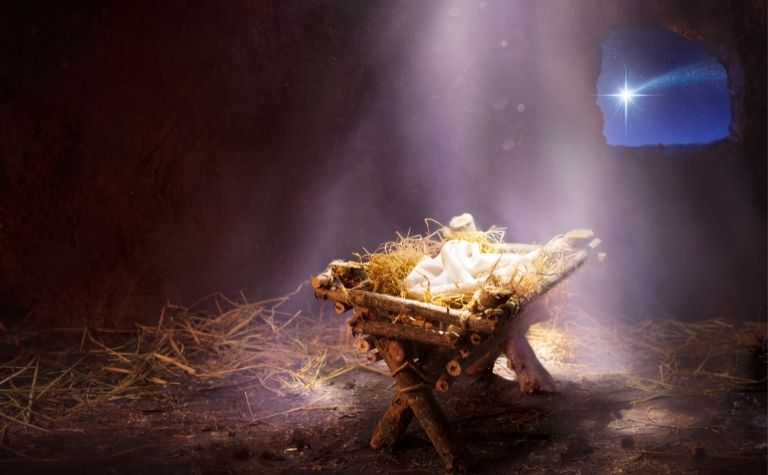Unlike the Advent hymn O Come, O Come, Emmanuel, which expresses hope and longing for the coming of the Messiah, Joy to the World! celebrates his arrival. A time of mourning (the cross) lies in the future, but the birth of a baby boy in Bethlehem to Mary is a time for dancing (Ecc. 3:4).
Joy is the theme of the hymn. An energetic, joyful, celebratory hymn of praise, Joy to the World! warms the hearts of those who sing it and turns their gaze to the Savior of humanity, the Son of God, Jesus Christ. It’s hard for the faithful to sing this hymn without a smile on their face.
John MacArthur writes, “Spiritual joy is not an attitude dependent on chance or circumstance. It is the deep and abiding confidence that regardless of one’s circumstances in life, all is well between the believer and the Lord.”
Joy to the World! is a hymn for the saved who refuse to silence their praise in response to God becoming a man in Jesus of Nazareth.
For more see Advent Christmas Hymns: 151 Favorites

Lyrics to the Advent Hymn Joy to the World!
Joy to the World! contains several clear references to the Bible’s teaching about the person and work of Christ. Scripture teaches that Jesus is King of Kings and Lord of Lords, an identity that the hymn reflects on with passionate praise.
The lyrics also guide worshipers into recognizing Jesus as Savior, curse-breaker, and the embodiment of grace and truth. John 1:14 reads, “And the Word became flesh and dwelt among us, and we have seen his glory, glory as of the only Son from the Father, full of grace and truth.” (ESV)
| 1 Joy to the world, the Lord is come! Let earth receive her King; let ev’ry heart prepare him room and heav’n and nature sing, and heav’n and nature sing, and heav’n, and heav’n and nature sing. |
| 2 Joy to the earth, the Savior reigns! Let men their songs employ, while fields and floods, rocks, hills, and plains, repeat the sounding joy, repeat the sounding joy, repeat, repeat the sounding joy. |
| 3 No more let sins and sorrows grow nor thorns infest the ground; he comes to make his blessings flow far as the curse is found, far as the curse is found, far as, far as the curse is found. |
| 4 He rules the world with truth and grace and makes the nations prove the glories of his righteousness and wonders of his love, and wonders of his love, and wonders, wonders of his love. |
The faithful who sing Joy to the World! are persuaded to conform their hearts and minds to Scripture’s teaching about Christ’s arrival. As David Garland points out below, the world’s celebration of the season is hallow. The believer’s celebration, however, is substantively Christ-centered and biblically-based.
Garland writes, “The sentimental Christmas may be popular as a religious holiday for some because it can come off as celebrating the birth of a helpless baby. Jesus lies in a manger to be gazed upon and adored, but not to be heard and heeded. A speechless babe wrapped tightly in swaddling cloths seems more obliging in allowing people to tailor their religious beliefs however they see fit.”
For more see O Come O Come Emmanuel to learn more.

Story of Joy to the World!
In Genesis 3, one of the great tragedies in all of Scripture occurs. Adam and Eve sin against God, and are banished from the garden as God puts a curse upon the ground. It is a heartbreaking rupture in God’s perfect creation, and it is hard not to read this text without feeling a twinge of despair.
And yet, before the curse comes a promise. God declares that the woman shall bear offspring that will crush the head of the serpent. Jesus, the Son of Man and Son of God, will come to break the curse, to renew the creation, to make whole what is now broken.
In Psalm 98, all of creation is called upon to make a joyful noise before God, for the Lord has come to “judge the earth,” and restore His Creation. We should not fail to see our own hand at work in the destruction of creation, in our sins of waste and decadence.
This “judgment of the earth” is, in some part, a judgment of us as caretakers. But God is merciful and full of grace, and rather than leave everything in our hands, He gives us the Life-giver.
In this beautiful hymn, Isaac Watts makes the connection between the coming of Christ into this world and the beginning of that restoration.
Christ brings “joy to the world,” a light where there is darkness, growth where there is decay. And we, along with all Creation, respond with a song of praise. (From hymnary.org)
For more see What Child Is This? to learn more.

Advent: Meaning, Dates, and History
The word “Advent” comes from the Latin word Adventus, meaning a “coming” or “arrival.” It describes the ecclesiastical season immediately before Christmas.
In the Western world, Advent Sunday, i.e. the first day of Advent, is the Sunday nearest to Saint Andrew’s Day (i.e. Nov. 30). Four Sundays in Advent precede Christmas Day. In the East, Advent is longer, beginning in the middle of November.
Advent Sunday is traditionally the day on which the ecclesiastical year begins. The first clear references to the season in the West come from the latter half of the 6th century.
Advent is observed as a time or preparation for Christmas like Lent is for Easter.
For more see O Come All Ye Faithful to learn more.
Bible verses related to the hymn for Advent
- Matthew 1:21, “She will bear a son, and you shall call his name Jesus, for he will save his people from their sins.”
- Matthew 1:23, “Behold, the virgin shall conceive and bear a son, and they shall call his name Immanuel” (which means, God with us).”
- Luke 2:7, “And she gave birth to her firstborn son and wrapped him in swaddling cloths and laid him in a manger, because there was no place for them in the inn.”
- John 1:1, “In the beginning was the Word, and the Word was with God, and the Word was God.”
- John 1:17, “For the law was given through Moses; grace and truth came through Jesus Christ.”
- Galatians 4:4, “But when the fullness of time had come, God sent forth his Son, born of woman, born under the law”
- Hebrews 1:3, “He is the radiance of the glory of God and the exact imprint of his nature, and he upholds the universe by the word of his power. After making purification for sins, he sat down at the right hand of the Majesty on high”
Please see related articles below

Related Articles
O Come, O Come Emmanuel is a beautiful Advent hymn that transports people back to ancient Israel before the time of Jesus Christ. It reflects the challenge of waiting for the arrival of the Messiah...
The Christmas season is full of festive music like the beloved Advent hymn, O Come, O Come, Emmanuel. Like the biblical stories that tell about the birth of Jesus Christ, the songs of Advent contain...
